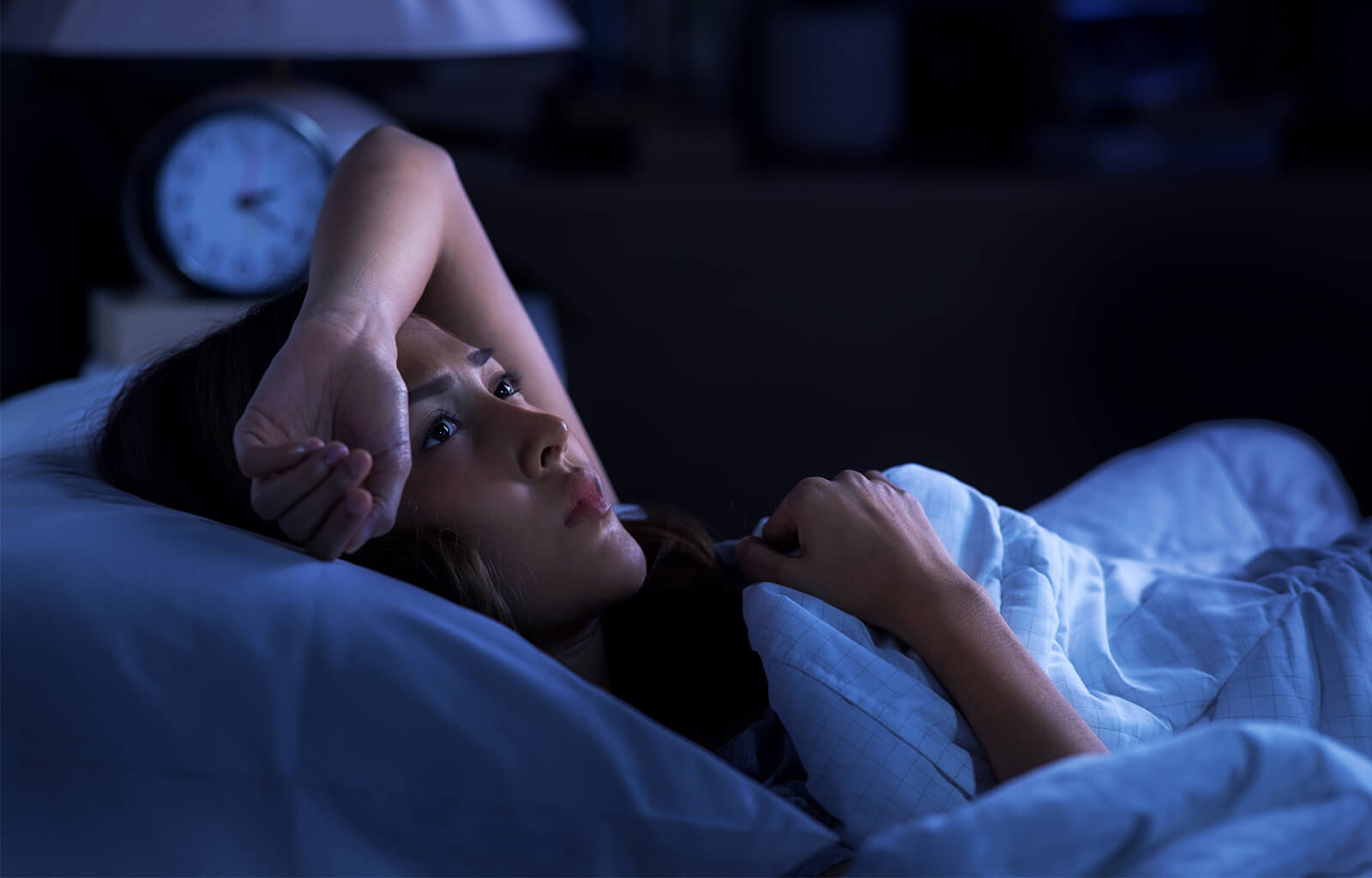
The most common sleep disorders - causes and first aid
Table of contents
- Sleep disorders
- Causes of sleep disorders
- The most common sleep disorders
- Difficulty falling asleep
- Difficulty sleeping through the night
- Sleep-related breathing disorders
- Disturbances of the sleep-wake rhythm
1. Sleep disorders
We spend around a third of our lives sleeping – at least if we get the average and recommended sleep duration of 7-8 hours. However, especially in hectic everyday life or stressful professional lives, we often lack sleep, and one in five people in Germany suffers from sleep disorders. A study by DAK also shows that working people are particularly affected, with 80% of employees already suffering from sleep disorders and problems falling asleep and staying asleep. Women tend to be affected more often than men.
We all have trouble sleeping at some point and end up feeling tired, irritable, and lacking energy the next day. Long-term difficulty falling asleep, repeatedly waking up, or lying awake for hours not only harms our daily well-being, performance, and mental health, but can also lead to serious health consequences, such as an increased risk of cardiovascular disease and depression. What we can do to improve our sleep depends primarily on the type, severity, and cause of our sleep problems.
2. Causes of sleep disorders
Sleep medicine distinguishes between more than 80 different sleep disorders. A sleep disorder is generally defined as one in which the affected individual experiences non-restorative sleep. Difficulty falling asleep, staying asleep, and sleep-wake rhythm disturbances are particularly common and impact the natural sleep pattern to such an extent that sleep quality is reduced and restful sleep becomes less restful.
There can be a wide variety of causes for each type and severity of sleep disorders. Factors such as environmental influences (e.g., light, noise, sleeping environment) or our own sleep habits (bedtime, sleep hygiene) are relatively harmless and relatively easy to influence. However, serious illnesses and organic or psychological conditions can also negatively impact sleep and thus place additional strain on us.
Important: Chronic sleep disorders can harm your health and significantly reduce your quality of life, so you shouldn't take lack of sleep lightly!
3. The most common sleep disorders
Chronic insomnia includes, among other things, difficulty falling asleep and staying asleep and is the most common type of sleep disorder. Many people also suffer from They are affected by breathing difficulties during sleep or disturbances in the sleep-wake rhythm and sometimes even suffer unconsciously from the numerous consequences of these sleep disorders.
#1 Trouble falling asleep

Our internal clock is responsible for our body coming to rest in the evening. As darkness increases, the secretion of sleep hormone melatonin, which makes us tired and sleepy – we fall asleep. Numerous external and internal influences can affect hormone levels and hinder falling asleep. If falling asleep regularly takes longer than 30 minutes after going to bed, health experts refer to sleeplessness.
Common causes: An irregular sleep-wake rhythm, acute and chronic stress, poor nutrition or external stimuli such as bright light, noise and sleeping environment can affect the hormonal balance or disrupt the relaxation that is important for sleep.
First aid: Observe general sleep hygiene, maintain a regular sleep-wake rhythm, avoid heavy meals and foods containing caffeine and high sugars.
#2 Trouble sleeping through the night

Sleep disturbances are primarily manifested by those affected repeatedly waking up during the night and having difficulty falling back asleep. Our sleep usually follows fixed sleep cycles, including both light and deep sleep phases. Involuntary awakening from a deeper sleep phase is particularly detrimental to sleep quality, as deep sleep is when the body and mind regenerate. Awareness of sleep problems can also lead to stress and anxiety in those affected during the night, making it even more difficult to fall asleep again. You can find out more about the causes of nighttime waking. here.
Common causes: External stimuli such as light, noise, temperature and sleeping environment, frequent urination, poor diet, physical discomfort and stress can lead to sleep being disturbed and falling asleep again becoming a challenge.
First aid: Observe general sleep hygiene and avoid potential distractions before falling asleep. For example, reduce fluid intake in the evening, promote relaxation, and remain calm and relaxed even during waking hours.
#3 Sleep-related breathing disorders

Breathing irregularities and disorders are also widespread. These include snoring, for example, but also the occurrence of breathing pauses, known as sleep apnea. Snoring usually manifests itself as the typical loud breathing noises, which are, however, caused by narrowed airways and can thus directly disrupt one's own sleep as well as that of our partners. Sleep apnea, on the other hand, describes the brief pauses in breathing for pauses of up to ten seconds. These breathing pauses activate the brain and thus repeatedly interrupt sleep.
Common causes: The narrowing of the airways can be caused by allergies or colds, for example, but unfavorable sleeping positions and malformations of the oropharynx can also narrow the airways.
First aid: Obesity, alcohol and nicotine consumption, and an unsuitable sleeping position can contribute to breathing disorders during sleep. We have simple tips for snoring. here described.
#4 Disturbances of the sleep-wake rhythm

Disturbances of the so-called circadian rhythm occur particularly frequently as intermittent sleep disturbances. It's not for nothing that humans are creatures of habit, because our internal clock regulates our sleep-wake cycles in such a way that we become tired as darkness increases, sleep during the night, and wake up again at dawn.If this rhythm gets out of balance, it is often difficult to get restful sleep or even fall asleep at all.
Common causes: Shift work and traveling across different time zones in particular mean that we have to be active or sleep at unusual times.
First aid: Avoid frequent changes in sleep and wake times, as these disrupt the balance of your body and mind and prevent the development of healthy sleep habits. Also interesting: Sleep well despite shift work.
Nowadays, there are numerous dietary supplements and medications designed to specifically support falling asleep and ensure a good night's sleep. However, many common, especially chemical, sleeping pills can suppress natural sleep and quickly become addictive. If you need help falling asleep, you should definitely look for natural active ingredients and a natural mode of action. Depending on the cause and severity of your sleep disorder, even small measures like changing your sleeping habits or practicing proper sleep hygiene can sustainably improve your sleep and ensure you can start the day full of energy. Sleep well!
4. Conclusion
-
Sleep disorders are widespread and already affect 80% of working people in Germany.
-
Sleep disorders can have numerous negative effects on physical and mental health and can arise from a variety of external and internal causes.
-
The most common sleep disorders are difficulty falling asleep and staying asleep, sleep-related breathing disorders such as snoring or sleep apnea, and sleep-wake rhythm disorders.
Best wishes and see you soon!



Leave a comment
This site is protected by hCaptcha and the hCaptcha Privacy Policy and Terms of Service apply.